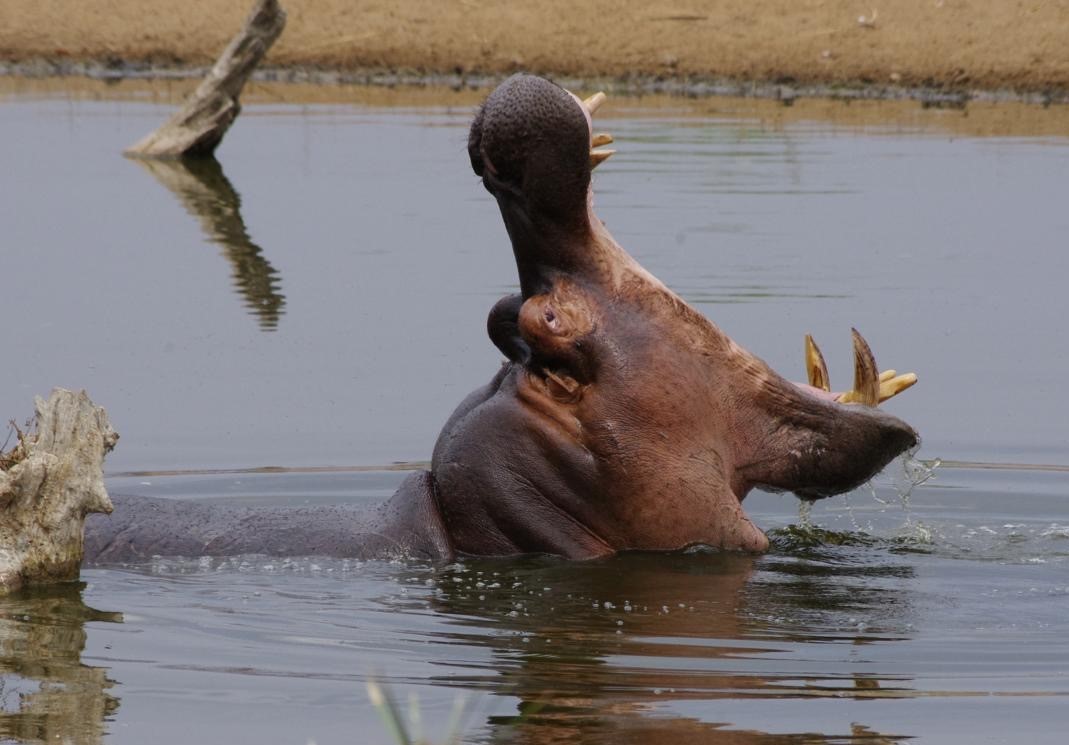Trophy hunting for African big game in Namibia is most certainly increasing and Namibia is one of Africa’s premier big game hunting destinations.
[DYNAMIC-BLOGTABLEOFCONTENT]
Key Takeaways
- Namibia remains a safe destination to travel to and enjoy a hippo hunt and other hunting adventures in.
- The destination produces world-class big game trophies.
- Namibia is renowned for its free-range areas where hunters can target members of the Dangerous 7.
- Hippos are exceptionally dangerous, and the world’s second largest land mammal.
- They are killing machines, taking more than 500 human lives annually.
- When preparing your rifle for the hippo hunt consider the season in which you will be hunting, as the dry season requires a different rifle from the wet season, due to the vegetation and hippo’s habitat at the time.
- While exportable hippo hunts are popular, the price difference between an exportable and non-exportable trophy is around US$6,000, which can be used towards hunting a Nile crocodile or other big game, such as elephants, in the area.
- Essential items such as binoculars, hats, and even antibiotics should not be forgotten for a hippo hunting adventure.
- Accurate shot placement during the hippo hunt will see the prey have a humane and quick death.
- Inaccurate shot placement, with a very aggressive and dangerous hippo, is to be avoided at all costs. If in doubt, leave the shot.
- Hippo hunts in Namibia benefit the communities, by providing protein as well as employment for local people.
- Lastly, be prepared for your hippo hunt. Not just physically, but mentally as well. Hippo hunting in Namibia is not for the faint-hearted!
Why are so many Hunters Attracted to Namibia for African Big Game Hunts?
- Namibia is a safe destination for a hunting safari, with a low crime rate.
- Hunting safaris are affordable and value for your “buck.”
- Namibia is easily accessible for international travelers via Hosea Kutako International Airport (Previously known as Windhoek).
- Big game hunting safaris in Namibia are known to produce world-class trophies.
- Namibia hunting outfitters uphold world-class standards.
- Big game hunting for the Dangerous 7 is conducted in free-range areas, unlike South Africa where many acres are fenced in. Free-range hunts are often considered synonymous with “fair chase.”
- The population density in Namibia is extremely low. Namibia, a country roughly the size of South Africa has a population of only 2,2 million people.
- Namibia is known for its diverse landscapes, from the world-famous Namib Desert to the Zambezi Region (formally known as the Caprivi Strip).
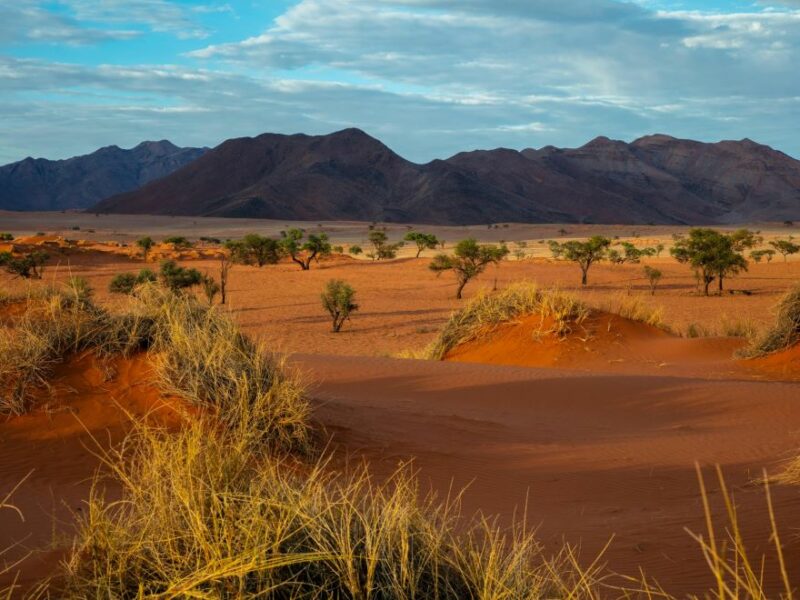
Getting to know your Adversary: The Trophy Bull Hippo
The hippo, after the African elephant is the world’s second largest land mammal. A hippo’s closest relative is the Blue Whale, and is also known as a “Water Horse.”
Hippos are not to be messed with. They are exceptionally dangerous and certainly not to be underestimated in any way during your Namibia hunting safari. They are armed with razor-sharp tusks made of ivory which can easily reach a length of 1,6 feet, capable of “chomping” a grown man into pieces. Local fishermen making use of handmade canoes called Mokoros, are always on high alert and try to stay a fair distance away from any hippo activity.
Hippos can live up to 50 years and it is estimated that hippos annually kills more than 500 Africans annually.
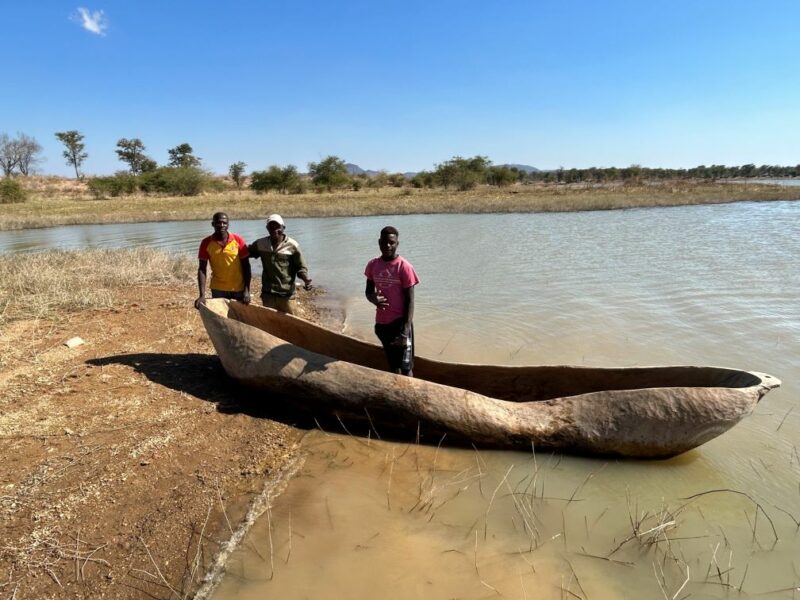
Hippo Hunting in Namibia: Which Rifle will be the Better Choice?
Before opening your saferoom door and considering which rifle to pack, your favorite 500 NE double, or the .375 with a superior quality scope, consider in which season the hippo hunt will be taking place.
In the drier months, namely May through to middle September, you may find the hippo out of the water. This will mean that following a good stalk, and assuming that up close and personal at 30 yards is the hunter’s intent, pack your double rifle loaded with excellent quality expanding bullets for this hippo hunt.
The Zambezi Region is also famously known for flooding during the wet season. The result of all this water means that your trophy hippo’s habitat will have increased and the chances of finding the hippo out of the water will be slim, to none. As such, the .375 will be a better option as the kill shot will be directly from the front penetrating the brain, or from the side, entering the brain between the ear and the eye.
We will be going to Namibia again for a hippo hunt later this year, covering all bases, and knowing full well that a trophy hippo bull does exactly as he pleases, we will be sure to have both calibers readily available!
Hippo Hunting in Namibia: Fully Exportable or Non-Exportable Hippos?
Considering that a fully exportable hippo hunt safari costs a substantial amount of money, considering hunting non-exportable hippos, and then adding a crocodile to the mix is also an option. The price differential between the two hippo hunts is approximately US $ 6,000. This excludes the cost of dip and pack, shipping, and taxidermy. African big game safaris can be expensive, and many first-time hunters do not allow for these additional costs.
In my opinion, having already completed a fully exportable hippo hunting safari in Namibia, the next safari will be taking the non-exportable option. As the hunting safari includes seven days of hunting, I prefer to utilize these funds and add a giant Nile crocodile.
Crocodile hunting in Namibia is often done in conjunction with hippo hunts as these guys share the same waterways, estuaries, and swamps.
Crocodile hunting in Namibia is known to produce trophies consistently of over 15 feet, with larger prehistoric reptiles of over 16 feet being harvested.
If during the safari planning phase, you consider adding a crocodile, then be sure to take the .375 loaded with monolithic tips.
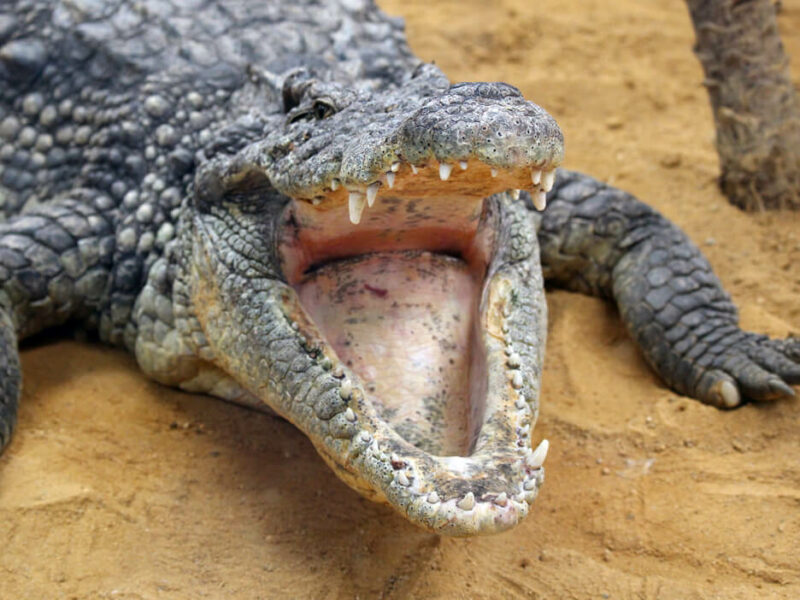
Additional African Big Game available in the Zambezi Region
Hunting the Cape buffalo in this region is also an option as an add-on to the hippo hunting safari. Cape Buffalo in this region of Namibia does not get as large as in other countries and averages approximately 39 inches.
Elephant hunting in Namibia is also a point to ponder, but again Chobe Elephant, while still being classified as a Kalahari Elephant, are not as large as their cousins further North. Should the hippo hunt include elephant hunting, know that these elephants average in size between thirty-five and forty-five pounds. If time is not available and you wish the African hunt to include both species, it would be recommended to hunt elephants in Namibia in the Bushmanland concessions.
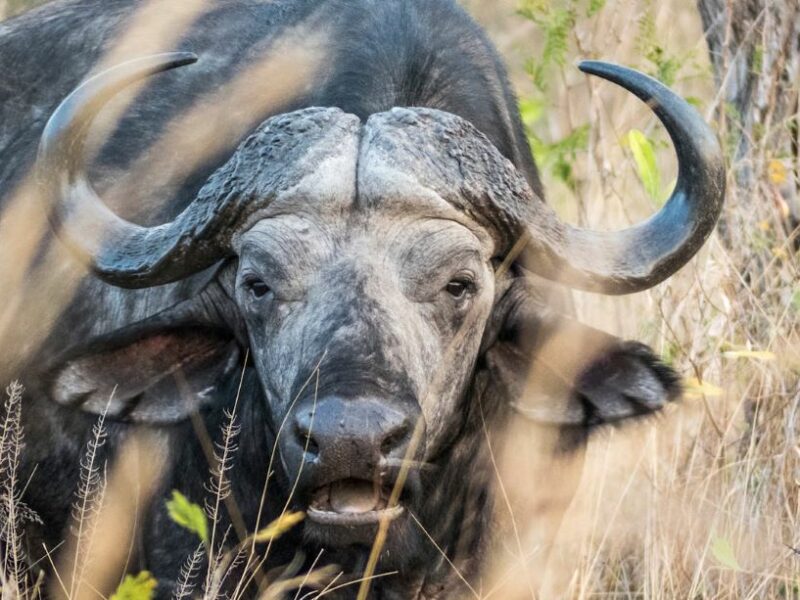
Hippo Hunting in Namibia: Essential Items to Have Available
No matter the season, during daylight hours temperatures will be high. Do not rely on a peak cap to protect you from the UV rays but acquire a “floppy” safari hat that will cover your ears and shade your face. While no hunter looks particularly “formidable” in this attire, it is effective. A huge concern in this environment, apart from being mauled by a hippo, is sunstroke. These UV rays also reflect off the water and do considerable damage.
Besides being loaded with the rifle and ammunition, a good pair of binoculars is essential, especially when identifying a trophy hippo bull from a distance on your big game hunting safari. The same piece of equipment is needed when crocodile hunting in Namibia.
Ask your medical practitioner to provide a prescription for a general antibiotic. As the hunter will be traveling and mingling with many people on the way to the hippo hunting grounds, it is always better to be prepared. You don’t want to spoil your hippo hunt by feeling unwell.
Hippo Hunting in Namibia: Preparing for Accurate Shot Placement
When hunting all the African big game animals, shot placement is critical, especially when taking the brain kill shot which may be the only option the hippo presents. A successful safari hunting trip is going home with the trophy. A near miss will result in the hippo momentarily being knocked unconscious. If this does not result in the hippo drowning, it will vanish into the depths. Preparing for the safari hunting expedition is going to require some time on the range.
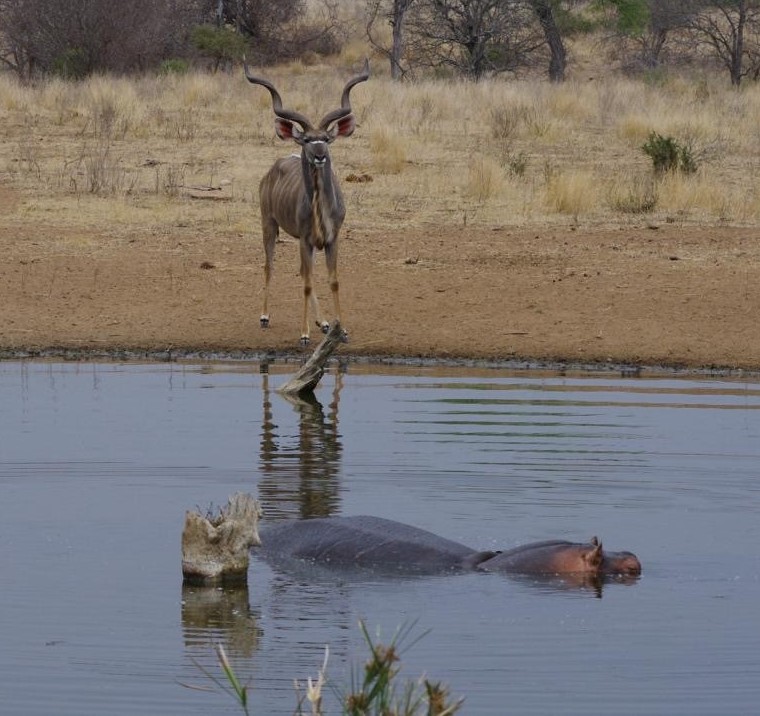
Community Benefits of a Hippo Hunting Safari in Namibia Aren’t Always Considered
Safari hunting is not always about the African big game trophy but about contributing and adding value to the local communities.
Local communities are dependent on a successful hippo hunting safari. Meat harvested and processed from the hippo hunt is allocated and apportioned between the villages under the supervision of the local chiefs.
It is exceptionally rewarding to know that not only was your hippo hunting safari in Namibia successful, but you fed entire villages! In addition, trophy hunting in Namibia creates employment and job opportunities. In Africa, if it pays, it stays.
Frequently Asked Questions
What caliber is used in Namibia hunting?
As hippos are seen as a dangerous game species, the minimum legal requirement of a .375 is needed, with solid bullets.
Is hippo meat edible?
Yes, you can eat hippo meat. Meat harvested and processed from the hippo hunt is allocated and apportioned between the villages under the supervision of the local chiefs.
Are hippos allowed to be hunted in Africa?
Yes, hippos can be legally hunted in many African countries. Hippos are hunted in many African countries, including Namibia, South Africa, Mozambique, Zambia, Zimbabwe, Tanzania, and Uganda.
Why do people hunt hippos?
While traditionally hippos are hunted for ivory, modern game hunting enthusiasts also enjoy a hippo hunt that challenges their hunting skills. As one of Africa’s Dangerous 7, the hippo is a sought-after trophy for many hunters.
Which African countries have hippos?
Hippos are found in a variety of African countries, with the most popular countries for hippo hunting including Zimbabwe, South Africa, Namibia, Zambia, Mozambique, Tanzania, and Botswana.
What kills hippos in the wild?
While not many animals are willing to take on a fully grown, aggressive hippo, their offspring do fall prey to crocodiles, lions, and hyenas.
Are hippos afraid of any animals?
Due to their size, stamina, and sheer aggression, hippos are not afraid of many animals, apart from themselves.
Can I outrun a hippo?
No, you cannot outrun a hippo. Although these large mammals look slow and sluggish, they can reach speeds of up to 30 miles per hour. Should you be charged by a hippo, try to put an obstacle between you and it, such as an anthill, fallen tree, or large rock. Should you be lucky enough for a tree to be nearby and it is suitable, climb it!
What is the hippo’s biggest enemy?
While hippos don’t have many enemies, the lion, Nile crocodile and spotted hyena will target and kill young hippo calves.
Preparation is Key for African Big Game Hunting
When safari hunting for the African big game, never underestimate the importance of being over-prepared, mentally, physically, and comprehensively in terms of planning. Hippo hunts in Namibia make for an exciting safari hunting adventure!
Read about my first experience of hunting this member of the Dangerous 7 while hippo hunting in Namibia.
Author: PC van Wyk
